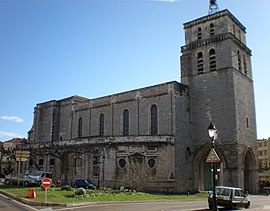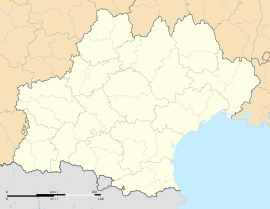Alès (French: [alɛs] ) is a commune and subprefecture in the Gard department in the Occitania region in Southern France. Until 1926, it was officially known as Alais.
Alès | |
|---|---|
Subprefecture and commune | |
 | |
| Coordinates: 44°07′41″N 4°04′54″E / 44.1281°N 4.0817°E | |
| Country | France |
| Region | Occitania |
| Department | Gard |
| Arrondissement | Alès |
| Canton | Alès-1 Alès-2 Alès-3 |
| Intercommunality | Alès Agglomération |
| Government | |
| • Mayor (2020–2026) | Max Roustan[1] |
Area 1 | 23.16 km2 (8.94 sq mi) |
| Population (2021)[2] | 43,892 |
| • Density | 1,900/km2 (4,900/sq mi) |
| Time zone | UTC+01:00 (CET) |
| • Summer (DST) | UTC+02:00 (CEST) |
| INSEE/Postal code | 30007 /30100 |
| Elevation | 116–356 m (381–1,168 ft) (avg. 150 m or 490 ft) |
| 1 French Land Register data, which excludes lakes, ponds, glaciers > 1 km2 (0.386 sq mi or 247 acres) and river estuaries. | |
Geography
editAlès lies 40 kilometres (25 miles) north-northwest of Nîmes, on the left bank of the river Gardon d'Alès, which half surrounds it. It is located at the foot of the Cévennes, near the Cévennes National Park. Alès station has rail connections to Nîmes, Mende and Clermont-Ferrand.
History
editAlès may be the modern successor of Arisitum, where, in about 570, Sigebert, King of Austrasia, created a bishopric. In his campaign against the Visigoths, the Merovingian king Theudebert I (533–548) conquered part of the territory of the Diocese of Nîmes. His later successor Sigebert set up the new diocese, comprising fifteen parishes in the area controlled by the Franks, which included a number of towns to the north of the Cevenne: Alès, Le Vigan, Arre, Arrigas, Meyrueis, Saint-Jean-du-Gard, Anduze, and Vissec. The diocese disappeared in the 8th century with the conquest of the whole of Septimania by the Franks.[3][4] No longer a residential bishopric, Arisitum is today listed by the Catholic Church as a titular see.[5]
After the Edict of Nantes, Alès was one of the places de sûreté given to the Huguenots. Louis XIII took back the town in 1629, and the Peace of Alès, signed on 29 June of that year, suppressed the political privileges of the Protestants, while continuing to guarantee toleration.[6]
At the request of Louis XIV, a see was again created at Alais by Pope Innocent XII, in 1694. The future Cardinal de Bausset, Bossuet's biographer, was Bishop of Alais from 1784 to 1790.[6] It was suppressed after the French Revolution, and its territory was divided between the diocese of Avignon and the diocese of Mende.
Demographics
edit
|
| ||||||||||||||||||||||||||||||||||||||||||||||||||||||||||||||||||||||||||||||||||||||||||||||||||||||||||||||||||
| |||||||||||||||||||||||||||||||||||||||||||||||||||||||||||||||||||||||||||||||||||||||||||||||||||||||||||||||||||
| Source: EHESS[7] and INSEE (1968–2020)[8] | |||||||||||||||||||||||||||||||||||||||||||||||||||||||||||||||||||||||||||||||||||||||||||||||||||||||||||||||||||
Economy
editAlès is the centre of a mining district and hosts the École des Mines d'Alès.
Historically, according to the Encyclopædia Britannica Eleventh Edition (1911):
- "The town is one of the most important markets for raw silk and cocoons in the south of France, and the Gardon supplies power to numerous silk-mills. It is also the centre of a mineral field, which yields large quantities of coal, iron, zinc and lead; its blast-furnaces, foundries, glass-works and engineering works afford employment to many workmen."[6]
Sports
editThe town has one association football team called Olympique Alès who currently play in the Championnat National.
Sights
editHistorically, according to the Encyclopædia Britannica Eleventh Edition:
- "The streets are wide and its promenades and fine plane-trees make the town attractive; but the public buildings, the chief of which are the Saint-Jean-Baptiste cathedral, a heavy building of the 18th century, and the citadel, which serves as barracks and prison, are of small interest."[6]
Notable people
edit- Rigord (c. 1150 – c. 1209), chronicler (probable birthplace)
- Jean-Pierre des Ours de Mandajors (1679–1747), historian and playwright
- Jean-Baptiste Dumas (1800–1884), chemist
- Gabriel Montoya (1868–1914), Parisian chansonnier
- Charles Dugas (1885–1957), archaeologist and hellenist
- Edgard de Larminat (1895–1962), general
- Louis Leprince-Ringuet (1901–2000), physicist
- Lucile Randon (1904–2023), supercentenarian and former world's oldest person
- Maurice André (1933–2012), trumpeter
- Catherine Daufès-Roux (born 1963), former Member of Parliament
- Laurent Blanc (born 1965), footballer
- Stéphane Sarrazin (born 1975), sportscar racing driver, rally driver
- Romain Dumas (born 1977), sportscar racing driver
- Nabil El Zhar (born 1986), footballer
- Vincent Abril (born 1995), sportscar racing driver
Louis Pasteur did his research on the silkworm disease (pébrine and flacherie) at Alès, and the town dedicated a bust to his memory. There is also a statue of the chemist J.B. Dumas.[6] Alphonse Daudet wrote his semi-autobiographical novel "Le Petit Chose" while teaching at the Collège of Alès.[9]
Twin towns – sister cities
edit- Kilmarnock, Scotland, United Kingdom
Climate
edit| Climate data for Alès (Saint-Christol-lès-Alès) (1991−2020 normals, extremes 1949−present) | |||||||||||||
|---|---|---|---|---|---|---|---|---|---|---|---|---|---|
| Month | Jan | Feb | Mar | Apr | May | Jun | Jul | Aug | Sep | Oct | Nov | Dec | Year |
| Record high °C (°F) | 22.0 (71.6) |
24.4 (75.9) |
28.0 (82.4) |
32.0 (89.6) |
36.0 (96.8) |
43.4 (110.1) |
40.5 (104.9) |
44.1 (111.4) |
39.0 (102.2) |
33.0 (91.4) |
25.4 (77.7) |
21.5 (70.7) |
44.1 (111.4) |
| Mean daily maximum °C (°F) | 11.4 (52.5) |
13.0 (55.4) |
17.2 (63.0) |
20.1 (68.2) |
24.3 (75.7) |
29.2 (84.6) |
32.5 (90.5) |
32.0 (89.6) |
26.7 (80.1) |
20.7 (69.3) |
15.1 (59.2) |
11.6 (52.9) |
21.1 (70.0) |
| Daily mean °C (°F) | 6.4 (43.5) |
7.3 (45.1) |
10.8 (51.4) |
13.7 (56.7) |
17.7 (63.9) |
22.0 (71.6) |
24.8 (76.6) |
24.4 (75.9) |
19.9 (67.8) |
15.4 (59.7) |
10.2 (50.4) |
6.9 (44.4) |
15.0 (59.0) |
| Mean daily minimum °C (°F) | 1.5 (34.7) |
1.6 (34.9) |
4.4 (39.9) |
7.3 (45.1) |
11.0 (51.8) |
14.7 (58.5) |
17.2 (63.0) |
16.8 (62.2) |
13.1 (55.6) |
10.0 (50.0) |
5.3 (41.5) |
2.2 (36.0) |
8.8 (47.8) |
| Record low °C (°F) | −12.5 (9.5) |
−17.8 (0.0) |
−10.0 (14.0) |
−3.1 (26.4) |
−0.5 (31.1) |
3.0 (37.4) |
7.0 (44.6) |
5.0 (41.0) |
1.9 (35.4) |
−2.5 (27.5) |
−7.5 (18.5) |
−13.0 (8.6) |
−17.8 (0.0) |
| Average precipitation mm (inches) | 82.1 (3.23) |
55.7 (2.19) |
72.9 (2.87) |
83.1 (3.27) |
77.7 (3.06) |
49.1 (1.93) |
38.5 (1.52) |
50.3 (1.98) |
160.6 (6.32) |
153.5 (6.04) |
133.2 (5.24) |
89.8 (3.54) |
1,046.5 (41.20) |
| Average precipitation days (≥ 1.0 mm) | 7.1 | 4.9 | 5.6 | 7.2 | 7.5 | 5.3 | 3.8 | 5.2 | 5.9 | 8.7 | 8.8 | 7.3 | 77.4 |
| Source: Meteociel[11] | |||||||||||||
See also
editReferences
edit- ^ "Répertoire national des élus: les maires" (in French). data.gouv.fr, Plateforme ouverte des données publiques françaises. 13 September 2022.
- ^ "Populations légales 2021" (in French). The National Institute of Statistics and Economic Studies. 28 December 2023.
- ^ Saltet, Louis (1902). "L'évêché d'Arisitum". Bulletin de littérature ecclésiastique, publié par l'Institut Catholique de Toulouse (in French). 7–8: 220–231.
- ^ Duchesne, Louis (1907). Fastes épiscopaux de l'ancienne Gaule (in French). Vol. I. Paris. pp. 316–317.
{{cite book}}: CS1 maint: location missing publisher (link) - ^ Annuario Pontificio 2013 (Libreria Editrice Vaticana 2013 ISBN 978-88-209-9070-1), p. 839
- ^ a b c d e Chisholm, Hugh, ed. (1911). . Encyclopædia Britannica. Vol. 1 (11th ed.). Cambridge University Press. p. 468.
- ^ Des villages de Cassini aux communes d'aujourd'hui: Commune data sheet Alès, EHESS (in French).
- ^ Population en historique depuis 1968, INSEE
- ^ "Alès". Fédération d'Associations Eternel Alphonse Daudet (FederationAlphonseDaudet.fr) (in French). Archived from the original on 30 September 2020. Retrieved 6 August 2020.
- ^ "Town Twinning". east-ayrshire.gov.uk. East Ayrshire Council. Retrieved 20 April 2021.
- ^ "Normales et records pour Saint-Christol-lès-Alès (30)". Meteociel. Retrieved 14 December 2024.
External links
edit- Alès travel guide from Wikivoyage
- Official website (in French)
- The Regordane Way or St Gilles Trail which runs through Alès



